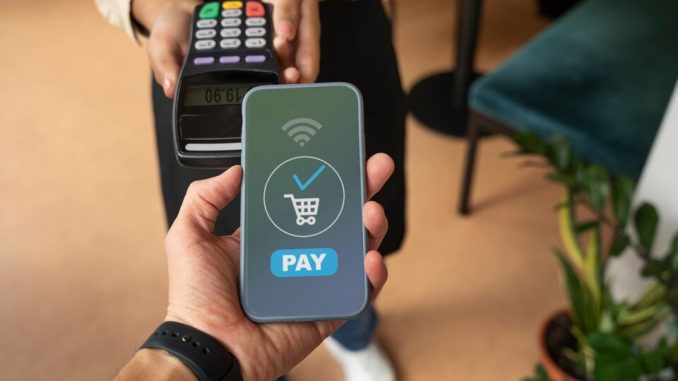
It is limitless, where ease, security, and innovation will change financial transactions. These tools have simplified and improved our economic life in a digital era. Mobile payments and digital wallets will become increasingly common in the future. The Internet of Things, biometric identification, and new security measures promise to make financial transactions more accessible and safer than ever. Join us as we explore the fascinating future of digital banking, where our creativity is the limit.
The Current Landscape Of Mobile Payments:
Mobile payments are part of our everyday routine. Smartphones have changed how we transact. The mobile payments ecosystem has many participants, technologies, and trends. Market leaders include Apple Pay, Google Pay, Samsung Pay, and PayPal. Popular payment solutions like these provide safe, contactless, and easy choices. Mobile payments also increased during the COVID-19 epidemic as customers sought touchless payment options. Mobile payments have expanded to include in-app purchases and contactless card payments, making them essential to contemporary business.
The Technology Behind Digital Wallets
Mobile payments rely on digital wallets, which have transformed financial management. Digital wallets, or e-wallets, securely hold credit card information on mobile devices for smooth transactions. Encryption protects sensitive data and transactions. Smartphones and wearables incorporate digital wallets so that consumers may access their payment information with a touch or fingerprint scan. NFC (Near Field Communication) technology allows contactless payments by securely transferring data between the device and the point-of-sale terminal. This technology improves ease and protects payment information.
Advantages And Benefits Of Mobile Payments:
Modern consumers are drawn to mobile payments and digital wallets due to their many benefits. The main advantages include convenience and accessibility. Mobile prices are fast and convenient, eliminating the need for cards or cash. Increased security is another benefit. Digital wallets safeguard payment data via encryption and tokenization, reducing fraud. Digital wallets can interface with loyalty programs and prizes, letting users easily earn points, discounts, and cashback. Digital wallets are more appealing as a complete financial management solution with this additional value.
Challenges And Concerns:
Despite their advantages, mobile payments and digital wallets have drawbacks. Security and privacy are top priorities. Cyber risks exist online; thus, protecting sensitive financial data is crucial. Digital wallets frequently share personal data with service providers, raising privacy concerns. Adoption difficulties and trust concerns are also significant issues. Digital wallets are unfamiliar to many customers. Thus, trust is crucial for broad adoption. Finally, regional regulatory and legal issues might hinder digital wallet services. These problems must be overcome as technology advances.
Emerging Trends In Mobile Payments:
Mobile payments are continually changing, with new trends affecting the market. Speed and convenience have made contactless payments, generally enabled by NFC technology, popular. P2P payments and money transfer applications have also become popular, allowing users to send and receive money quickly. Mobile costs across borders are increasing, removing geographical restrictions and facilitating worldwide transactions. Mobile payments are growing to meet more financial demands as these trends continue.
The Future Of Mobile Payments
The future of mobile payments is bright as they continue to alter transactions. Financial technology is developing swiftly because of technical advances, user preferences, and the need for simplicity, security, and accessibility. We discuss mobile payments and digital wallets’ intriguing futures here.
1. Seamless Integration Into Everyday Life:
Mobile payments will become increasingly integrated into everyday life. We’ll use digital wallets for more transactions as they become more common, including buying products and services, paying bills, managing subscriptions, and dividing restaurant checks. The simplicity and adaptability of mobile payments will make them the preferred financial transaction method.
2. Enhanced Security And Biometric Authentication:
We prioritize security, and mobile payments will become even safer. Facial recognition and fingerprint scanning will become ubiquitous, making digital wallets practically inaccessible to illegitimate users. These approaches will increase customer confidence and adoption.
3. Iot And Connected Devices:
The IoT will shape mobile payments. Intelligent products like fridges, vehicles, and wearables will accept payments. Your wristwatch may let you pay for groceries with a gesture. The interconnection of ordinary things will make mobile payments more accessible than ever.
4. Contactless And Nfc Evolution:
Contactless payments will progress despite their popularity. Advanced Near Field Communication (NFC) technology will enable faster, more secure transactions. Since mobile payments are contactless, cards and cash will be less needed.
5. Cryptocurrencies And Central Bank Digital Currencies (cbdcs):
Future digital wallets will support more currencies. Bitcoin and Ethereum will gain popularity and integration. Central banks are considering creating CBDCs that might be maintained in digital wallets. One platform will allow users to handle conventional and digital currency.
6. Personal Financial Management:
Mobile payments will simplify transactions and manage finances. AI will provide customized spending, savings, and investment information. Users may make educated financial choices using digital wallets as comprehensive financial management tools.
7. Blockchain For Transparency And Security:
Mobile payments will be more transparent and secure using blockchain technology. Smart contracts and blockchain-based solutions eliminate fraud and maintain transaction integrity. This technology will streamline and lower the cost of cross-border payments.
8. Cross-border Transactions:
Digital wallets and blockchain technology will simplify and lower the cost of cross-border transactions. Near-instant, low-cost cross-border payments will replace expensive, time-consuming international transfers.
9. Environmental And Sustainability Considerations:
Digital payments’ environmental effect will grow in importance. Mobile payment providers will use energy-efficient technology and encourage sustainability to reduce their carbon impact.
10. Collaboration And Open Banking:
Future mobile payments will emphasize collaboration. Open banking will create a more linked financial environment where customers may access several financial services on one platform. Digital wallets will unlock many economic benefits.
Conclusion
Mobile payments and digital wallets have revolutionized financial transactions with ease, security, and accessibility. A few significant businesses dominate the market, and several trends shape the industry. Encryption, NFC, and wearables make digital wallet transactions safe. Mobile payments are popular due to their ease, security, and benefits.
However, security, trust, and regulatory difficulties must be addressed. Contactless payments, P2P transfers, and multinational transactions are influencing the future. In the end, cryptocurrencies, AI, and blockchain will transform mobile payments, making them more accessible and technologically sophisticated.






Leave a Reply